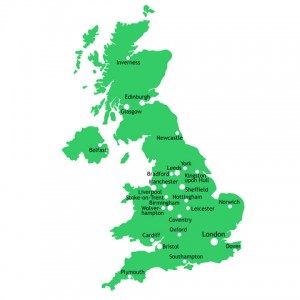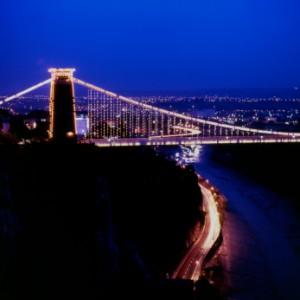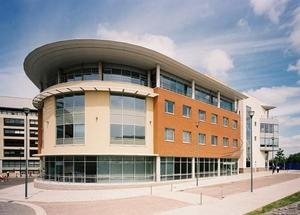
[Last updated February 2024] A guide to serviced offices and office space for rent in Bristol as well as general information that may be useful if you are thinking of renting office space in the city.
For further offices information or to search office space for rent in Bristol just click. Or contact us for any other query.
History & Geography
Bristol, the largest city in southwest England, is located on the Severn Estuary among the hilly country near the Rivers Avon and Frome. It is bordered by the Avon Gorge to the west and the Cotswolds to the east. While historical records reveal that there were numerous Iron Age forts in the area as well as settlements during the Roman era, Bristol was officially founded in 1000 CE and quickly grew to become an important centre of trade and commerce. By the late 11th century the town had been heavily fortified against invasion from Ireland, and later under Norman rule was the site of one of the largest castles in England. In the 12th century, the city’s port grew significantly off trade with Ireland, becoming one of the most important in the country. Later Bristol built up a large shipbuilding and manufacturing industry. In the 14th and 15th centuries, the town’s population was devastated by the Black Death which severely checked Bristol’s growth. Nevertheless, the port of Bristol continued to thrive and saw many important voyages launched from it, including John Cabot’s voyage to North America. During the English Civil War in the 17th century, the city was occupied by Royalist forces who built a large fort. In the 18th century, Bristol was an important link in the slave trade and trade with North America. Later in the 19th century, Bristol continued to prosper from its shipbuilding industry and was associated with famous engineer Isambard Kingdom Brunell who built the SS Great Britain and SS Great Western in Bristol, as well as the nearby Clifton Suspension Bridge. In 1909 the University of Bristol was opened and the city’s population continued to swell. Bristol was badly damaged during WWII by the Luftwaffe and large parts of the city had to be rebuilt after the war. Today the city is an important centre of media and creative industries and one of the most diverse cities in the UK.
Economy
Bristol has one of the strongest economies of any city in the UK, with a GDP regularly in excess of GBP 10 billion and a GDP per capita of about 40 percent more than the UK average. The Port of Bristol still plays a large part in the city’s economy, with the port being the largest importer of cars to the UK. Approximately 12 million tonnes of cargo go through the port every year and imports of wine, spirits and tobacco are especially large. Bristol’s economy is also very reliant on the aerospace and defence industry. The city is the site of the Defence Equipment and Support, the procurement agency of the Ministry of Defence, employing thousands of people in the area. The financial services sector is also a major employer in the city, as is the hi-tech industry. There are approximately 50 micro-electronics and silicon design companies in Bristol as well as the Hewlett-Packard national research laboratories. Bristol also has a large retail industry and is a popular destination with tourists from the rest of the UK and Europe.

Tourism & Culture
Bristol is renowned for its music and film industries as well as its urban art scene and nightlife. Among the famous bands originating in Bristol are Glaxo Babies and The Pop Group. The city inspired the ‘Bristol Sound’ also known as trip-hop and is the home of bands Massive Attack and Portishead and the artist Tricky. Famous graffiti artist Banksy also hails from Bristol and many of his pieces can still be seen in the city. Bristol also has a host of popular live music venues such as the Trinity Centre, Victoria Rooms, Bristol Academy and St George’s Bristol. There is also a thriving theatre scene in the city, with the most famous venues being the Bristol Old Vic and The Tobacco Factory. While many of Bristol’s oldest buildings were destroyed by bombing in WWII Bristol still retains many buildings from as far back as the middle ages. There is 51 Grade I listed buildings in the city and on the outskirts are many Tudor mansions built by the wealthy merchants of the city. Several of the more famous museums in Bristol are the Bristol City Museum and Art Gallery and the Bristol Industrial Museum, which has preserved dock machinery.
Transportation
There are two main railway stations in Bristol, consisting of Bristol Temple Meads, which is located in the centre and includes service to London Paddington. The second is Bristol Parkway, located slightly north of the city and serving Cardiff, London and Birmingham. Bristol Airport is the ninth busiest in the UK and has recently had extensive refurbishment carried out. In Bristol itself the most common and popular form of transport is the bus system, however, it has been criticised as being expensive and inefficient. Many residents of the city use personal vehicles and Bristol suffers from congestion.

Office space to rent in Bristol
In 2022, rented office take-up totalled 620,000 square feet which was 8% above the five-year annual average for Bristol.
Take-up was made up of 119 completed lettings – a total that is 18% above the five-year annual average and the most leasehold deals since 2016.
The largest deal was 55,000 square feet which was Paymentsense’s acquisition at CEG’s EQ building.
Bristol’s Grade A office space take-up in 2022 was 198,000 square feet and this represents a 100% increase on the previous year. The Grade A take-up accounted for 32% of the total deals done in the city.
Prime office rent in Bristol grew by 12% in 2022 to £42.50 per square foot which is the highest of the UK’s regional markets.
This has been driven by increased demand for high-quality office space with ESG and carbon net zero as key drivers.
In February 2024, it was announced that Investec Real Estate had provided Commercial Estates Group (CEG) with a £13.7 million investment loan which would be secured against the net-zero-carbon 1000 Aztec West office building that was completed in December 2023 refinancing an existing development loan.
The 73,000 sq ft Grade A office includes a 1,300 sq ft gym and wellness facility offering daily exercise classes to tenants, and is the South West’s first net zero carbon out-of-town office development, achieving a BREEAM Excellent and EPC A rating.
It is an all-electric building, is powered by renewable energy and boasts energy-efficient heating, cooling and lighting systems.
There are 28 flex space providers in Bristol that offer a wide range of flexible workspace solutions including private serviced offices, studio spaces, managed office suites and coworking membership plans for companies and individuals.
These options represent short-term occupational contacts with all-inclusive pricing, in the majority of cases.
Providers range from international operators such as WeWork to Bristol-based operators such as Mild Bunch. Profiles of all providers can be seen in this directory.
Our office space search, advisory and acquisition services are FREE, always. Our Bristol office space brokers and agents are globally regulated by the Royal Institution of Chartered Surveyors (RICS) ensuring the highest standards of commercial property advice and service at all times.
